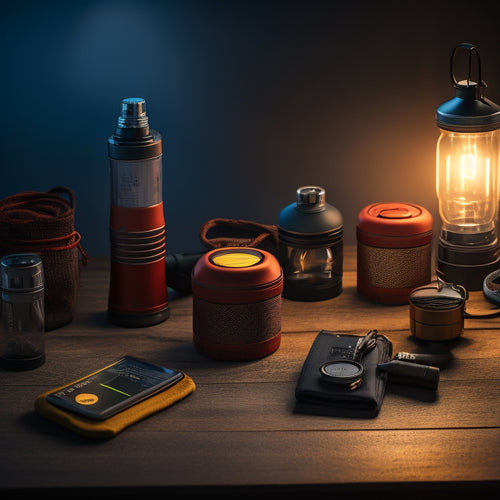
What's the Best Home Battery Backup Solution?
Share
To find the best home battery backup solution for your unique needs, you'll want to assess your energy usage patterns, high-power appliances, and grid stability requirements. You'll need to evaluate lead-acid batteries for short-term outages and lithium-ion for longer durations. Top options like Tesla Powerwall, LG Chem RESU, and Sonnen eco offer advanced features, but you'll need to take into account capacity, depth of discharge, and round-trip efficiency. By understanding your energy needs and comparing costs and values, you can select the right solution - and understanding the key features, installation process, and compatibility with your existing infrastructure will help you make an informed decision that meets your specific requirements, and there's more to investigate to find the perfect fit.
Key Takeaways
- Identify high-power appliances and energy usage patterns to determine suitable battery type and size for effective backup.
- Consider lithium-ion batteries for longer durations and lead-acid for short-term outages, evaluating capacity, depth of discharge, and round-trip efficiency.
- Research top-rated solar battery brands, such as Tesla Powerwall and LG Chem RESU, for innovative technology and performance.
- Assess upfront cost, ongoing expenses, and long-term savings, evaluating factors like installation process, maintenance, and potential utility fees.
- Evaluate battery type, installation factors, and compatibility with existing electrical infrastructure to choose the right solution for your specific needs.
Understanding Home Energy Needs
Your home's energy needs are a delicate balancing act, with various appliances and systems competing for power. To understand your energy consumption, you need to identify the devices that draw the most power. This includes your HVAC system, refrigerator, and electric water heater.
Residential battery systems can contribute to grid stability and demand response, making them a significant addition to your home's energy setup. By analyzing your energy usage patterns, you can determine the most suitable battery type and size for your backup system.
For instance, lead-acid batteries are suitable for short-term power outages, while lithium-ion batteries are better suited for longer-duration outages. Accurately evaluating your energy consumption enables you to choose the right battery type, ensuring your backup system meets your specific needs during a power outage.
Top Battery Backup Options
Evaluating various battery backup options is vital to finding the perfect fit for your home's energy needs.
You'll want to take into account solutions that offer high-performance lithium-ion batteries, which provide longer lifetimes and deeper discharge capabilities.
When selecting a battery, it's imperative to assess energy demands to determine the required energy storage for daily needs and calculate battery capacity to guarantee sufficient stored energy for requirements.
The Tesla Powerwall, for instance, is a popular choice, offering 13.5 kWh of energy storage and seamless solar integration.
The LG Chem RESU, another top contender, boasts a high-energy density and compact design.
Other options, like the Sonnen eco and SimpliPhi Power, offer advanced monitoring and control systems.
When selecting a battery backup solution, you'll want to evaluate factors like capacity, depth of discharge, and round-trip efficiency to make sure you're getting the most out of your investment.
Key Features to Consider
When it comes to selecting the best home battery backup solution, considering key features is vital to secure you get a system that meets your energy needs.
You'll want to evaluate the efficiency ratings of different systems, as higher ratings translate to more power stored per unit of energy consumed.
It's also important to investigate top-rated solar battery brands reliable online retailers that offer innovative technology and performance.
The installation process is another important factor, as it can impact the overall cost and complexity of the system.
Look for solutions with streamlined installation processes that minimize labor costs and downtime.
Additionally, consider the compatibility of the system with your existing electrical infrastructure and the level of monitoring and control you need to guarantee seamless backup power during outages.
Comparing Cost and Value
Three essential factors to evaluate in your cost-benefit analysis are the upfront cost, ongoing expenses, and long-term savings of a home battery backup solution.
You'll need to assess the initial investment, including the cost of the battery itself, installation, and any necessary hardware.
Ongoing expenses may include maintenance, replacement parts, and potential utility fees.
However, a home battery backup solution can provide long-term savings by reducing your reliance on the grid, lowering your electricity bills, and providing backup power during outages.
By evaluating these factors, you can determine whether a home battery backup solution is a beneficial investment for your specific needs.
Be sure to crunch the numbers and assess factors like your energy usage, local incentives, and the solution's expected lifespan.
Choosing the Right Solution
Now that you've weighed the costs and benefits, it's time to select a home battery backup solution that meets your specific needs.
You'll need to contemplate the type of battery that best suits your requirements. Lead-acid batteries are a cost-effective option, while lithium-ion batteries offer higher energy density and longer lifetimes.
Installation factors are also vital, as they impact the system's overall performance and safety. Think about the space available for the battery bank, the required electrical connections, and the need for ventilation or cooling systems.
Additionally, reflect on the compatibility of the battery solution with your existing electrical infrastructure and backup power sources, such as solar panels or generators.
Frequently Asked Questions
How Long Does It Take to Install a Home Battery Backup System?
Swiftly surveying your site, you'll spend roughly 2-5 days on the installation process, depending on complexity, with a typical installation timeline unfolding in three stages: assessment, setup, and testing, ensuring a seamless, hassle-free experience.
Can I Use a Battery Backup System With Solar Panels?
You can seamlessly integrate a battery backup system with your solar panels, enabling solar integration and energy independence. By storing excess energy generated during the day, you'll have a reliable power source when the grid goes down.
Are Home Battery Backup Systems Environmentally Friendly?
You're right to contemplate sustainability concerns when evaluating home battery backup systems, as they can greatly impact energy efficiency; look for systems with recyclable batteries, low waste production, and optimized charging cycles to minimize environmental footprint.
Can I Use a Battery Backup System for My Entire House?
You'll be surprised to know that 70% of US homes require less than 10 kW of power during outages. Can you use a battery backup system for your entire house? Yes, but you'll need to assess your whole house power needs and choose a system that matches your energy requirements.
Does a Battery Backup System Require Regular Maintenance?
You'll need to perform regular maintenance to guarantee your battery backup system operates efficiently, as neglecting maintenance can reduce the battery lifespan; typically, you'll need to check and replace electrolytes, clean terminals, and update software every 3-6 months.
Related Posts
-

Net Metering in Renewable Energy's Future
Net metering's future is vital for driving renewable energy growth and financial savings. You can reduce your electri...
-

How to Achieve a Zero-Waste Lifestyle for a Greener Tomorrow
To achieve a zero-waste lifestyle, start by adopting the principles of refusing, reducing, reusing, and recycling. Sw...
-

Best Solar Powered Flashlights for Emergency Situations
When you're choosing the best solar-powered flashlights for emergency situations, focus on their brightness, battery ...


